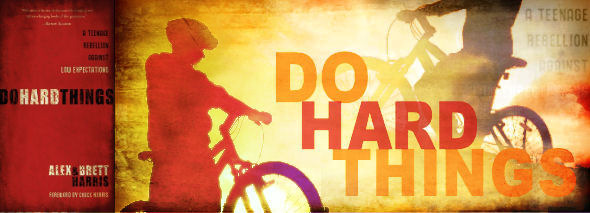
As I kid, I used to dream of being a ballerina. I begged my parents incessantly to send me to ballet school, spent day and night immersing myself in dance books and sugarplum-fairy dreams, and was ecstatic when my dad finally brought me to the local studio, with its splendid rooms and point-shoe-flooded hallways, to sign me up for lessons. Sadly, as most childhood dreams tend to do, this one dissipated as soon as I got a taste of the nitty-gritty: the pulled muscles, embarrassing falls, and instructor reprimands that reduced me to tears. I was quickly faced with the fact that I had bad knees, flat feet, poor balance, bad posture, and no musicality to speak of. I was enrolled in dance classes for just over a year before realizing, at the age of 12, that it simply wasn't for me.
Although I still stand by my decision -- having found, in recent years, that God had better plans in store for me -- I do have the occasional wave of nostalgia for the tutus and pointe shoes of my past. In fact, I sometimes take an hour out of my day to watch ballet videos on YouTube and let myself vicariously re-live those early Saturday mornings and long weeknight hours at the studio.
A few months ago, I happened upon a video showing two dancers from China perform a beautiful duet, blending acrobatics with elegance to form a stirring, fluid dialogue about love and hope. Like over 5 million viewers before me, I watched transfixed. The music was beautiful; the grace in each movement, exquisite. Something, however, was missing. Two things, in fact: the male dancer's leg, and the female dancer's arm. Rebuilding Dreams Ma Li, now 32, had just joined a professional dance company after years of rigorous training when she got into a bad car accident. Waking up at the hospital, Ma was horrified to discover that her right arm had been amputated. "I was shocked. ... How could [dance] be done with a physical deformity?" For this 19-year-old, every dream for the future had been hinged on her ability to move with grace, symmetry, and balance; and now, she could barely make her way through simple household tasks. Six years passed, with several changes in career, before Ma could accept her condition and return to the world of dance as an amputee. Several days before one of her performances, Ma met Zhai Xiaowei, an athlete who had lost his leg in a car accident at the age of 5. After a brief conversation, she invited Zhai to her show, and Zhai recalls feeling "electrified" as he watched her dance: "My hair seemed to stand on end... she danced gracefully, even though she had only one arm." With no prior experience, Zhai made the decision to join Ma in a dance partnership that would soon take China -- and the internet -- by storm. In 2007, the pair made their first public appearance when they entered a competition hosted by one of China's largest television networks, placing second out of 7,000 contestants with a dance entitled "Hand in Hand." You can watch this video below: The dance was far from your average pas-de-deux -- it was a display of utter teamwork and intricate interdependence. The partners knew one another's weaknesses, and made up for these by putting forth their strengths: where Ma had no arm, Zhai offered two of his own; where Zhai was missing a leg, Ma provided the strength in hers. As I watched the video, I began to wonder how much we could accomplish if we could only learn to do the same in our daily lives -- to focus on offering our best abilities, and let others fill in our weaknesses with their strengths. Unfortunately, many people lack the kind of attitude that has helped Ma and Zhai redefine the possibilities of dance. Most of us tend to fall into one of two traps: we either see other peoples' needs but refuse to offer our strengths in assistance, or we choose to focus our lives on things at which we're not gifted, fruitlessly trying to perform an arabesque without a leg to lift while our healthy arms dangle unused. Weakness: Obstacle or Opportunity? The first trap is very common, particularly in the arts world. When you send a demo tape or draft to a producer or publisher, how often do you get constructive, personalized advice in return? If you aren't one of the lucky ones whose work is accepted, you usually get a canned rejection letter or no response at all. Although these experts have enough knowledge and skill to help even the most hopeless of hopefuls improve, many of them don't share this knowledge with artists who don't quite meet their expectations. On a practical level, this is reasonable, since it takes both time and money to reply to people individually. In Christianity, however, this kind of attitude isn't acceptable -- and all too common among ordinary artists like you and I. I've often struggled with this when it came to sharing my writing and graphic designs skills. While door after door has opened for me to help out individuals and ministries with my abilities, I've turned many opportunities down in search of things that would be more "worth" my efforts. I used excuses like, "I have no time," "that ministry isn't professional enough," "I'm not good enough yet," or "I want to work for something bigger," and ended up hoarding my talents for myself instead of sharing them with the rest of the Christian body. As I eventually discovered, however, it was only through sharing my art skills that I could truly strengthen them -- even the smallest, least-professional ministry offers challenges and creative ideas that stretch artists' abilities, and as members become better with practice, these organizations grow larger and more professional. All that's needed to set off this chain reaction is to see weakness as an opportunity, not a criterion for giving up on somebody. When Ma saw Zhai for the first time, she could have said, "I can't dance with him, he has no leg." Instead, she thought, "I've got exactly what he lacks, and he has exactly what I need," and they joined forces to become a team. Taking on Too Much The second trap that artists may fall into is much more subtle and difficult to discern. On the surface, it can be called many things, like "widening one's horizons" or "becoming multiskilled" -- these, in themselves, are not bad things. But, deep down, they are often driven by a dissatisfaction with God's gifts -- a desire to exchange the unique ministry that God has chosen for each person for something more glamorous or well-paid. There is nothing wrong with experimenting: in fact, trying different things (which, like my ballet classes, may not quite work out in the end) can build up a huge inventory of "transferable skills" -- things like perseverance, courage, and appreciation, that can be applied to any of the arts. Even more importantly, experimenting can help you discover the ministry to which God has called you and pinpoint a few key areas that you're good at and passionate about. The problem comes in when Christians who already have a sense of their calling begin to lose focus in search of something "better." Experimentation becomes an issue when it takes our attention off of our God-given ministry and spreads us so thin that we have no time to properly nourish our true strengths. This, too, is a lesson I've learned through experience. At several points in my life, I received a pretty clear call from God to pursue the field of writing, but for me, writing isn't the most fun activity in the world. It takes concentrated effort, a consistent positive attitude, hours of research, and dogged determination in an ever-waging war against writer's block -- not to mention the less-than-ideal salary and the crazy competitiveness of the field. Is it my dream career? No -- if I were perfectly honest, I'd much rather have a job that requires less effort and gives more in return. But I've had many indications that God wants me to serve him through writing. Has this been enough to convince me? Unfortunately, no -- I've jumped around from one thing to the next: trying to teach myself piano, trying to master wheel pottery, teaching myself to sing, trying to learn Italian on my own, nearly switching career directions to become a statistician, and even going so far as to almost take up ballet again. All of these things have been fun, but not very rewarding -- I felt like a gardener who planted a hundred different seeds, and spent so much time moving from one to the next that none were properly tended to and they all ended up dead. Even worse, I forgot all about my true calling in the process, and left my gift for writing stagnant and under-nourished. Created for Harmony The problem is, when I fall into one of those two traps and cheat myself out of using the abilities that God has allotted to me, it's not just my loss -- it affects the entire Christian community. Everybody is given a unique part of the puzzle to fill, and I'm responsible for finding and focusing on the ministry for which God created me. If, figuratively speaking, he gave me a "hand" so that I could be a hand to those who have no hand, I should focus on using that hand instead of bemoaning the foot that I don't have -- there are others who can be that foot for me. We were created to complement each other's strengths and weaknesses, so when everybody works in harmony within the Church, there are no deficiencies that cannot be filled in by others. In fact, one of the central characteristics of a servant is to do one's part to the best of one's ability, and let others do their part. Jesus, who has absolutely no incompetencies, imperfections, or inabilities, still allows and encourages us to be his hands and feet. It's not that he needs us to do these things for him -- it's that he entrusts us with his work. He lets us do it so that we can grow. Is it tempting to steal the spotlight, to pretend that you have it all with no need for others? Yes -- and it's very selfish. For some people, "expanding their horizons" becomes a race for quantity, not quality -- a way to build up a big resume or add another accomplishment to the list of things they've tried in their lives. People enter fields that they have no true passion or talent for, produce lackluster work that lowers the standards in these industries, and fail to offer their true gifts to the body of Christ. Wouldn't it be better if everyone fulfilled their role and let others fulfill theirs? The young woman in the video didn't try to perform lifts using her one arm -- she let the man do that, and he ended up strengthening his arms. Likewise, he didn't try to do jumps and footwork that required two legs -- he left that job to the young lady's strong legs. Together, they reinforced their strengths and filled in each other's weaknesses, dancing in perfect union. And it was beautiful. Article by Oksana K.
Article by Oksana K.
Image credits: Graphic by Oksana K. Images from CCTV, DayLife; textures from Angelique Brunas and Sanami276.
Read more about Ma and Zhai here.
Tell others about this article using the "Share" button below. Thank you for your support!















1 comments
This article is beautifully written, as was Ma Li and Zhai Xiaowei's story of love and hope immaculately told. Thanks Oksana!
Post a Comment